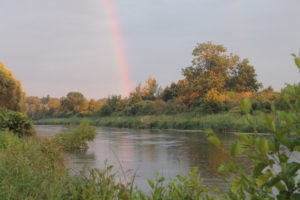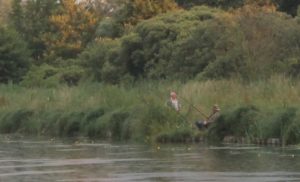Every year, we give over all of December (and usually most of January) to a series called ‘Shadows and Reflections’, in which our contributors share highs, lows and oddments from the past 12 months. Today it’s the turn of Dexter Petley.

A lost voice is a fallen thing, half disgrace as if through error, half wonder, like a star still shining at the last. Once gone, the world must change to have it back. The world did change, of course, the ambiguities of catch-2022, but the voice is missing, amid the shouting and the chaos. What is there to say, even were a voice to be found? There is nowhere left to speak, no hope of being listened to, no point in being heard.
Instead of which, who cares about all that. The locals here, this late November, wait for the apple press to trundle up and start our winter cider. Waxen piles of yellow skins blush red in morning sun, as they have year after year. Elsewhere, the air is thick with oak smoke flattened in a wettening mist. Ceps push on like armies marching on their stomachs. The chanterelles pitch camp on rotten stumps. Chestnuts have begun to root already. So many acorns like a Roman road, the boar are rolling in the aisles. An autumn risen from its August ashes, from when the sun’s heat fell perpendicular in a plumbline of molten scorch, which marked, I suppose, our just desserts, a fragment of hell, a world at death’s door.
It was in my village churchyard, somewhere on the Norman hills, high summer when only mad dogs and Englishmen climb labyrinthine steps at midday. Heat magnified off buttressed walls too bright to look upon. My three-inch shadow boiled down to size. A dog’s nugget cracked under shoe. Dried husks of sucked ants. One careless match could kick a ball of flame through the cellophane air. At a tap for watering the dead, I scorched my hands turning it on. The universal mourner; there was no one else in the cemetery this time of day. The quick were still eating, slowly, in the shade behind shutters down below, where once done they’d sleep till five o’clock. I dabbed hot water onto my neck, drips like the first blistering of old paint. You dared not keep it running long enough to cool, looting water from the corpses. Instead, I swallowed the heat and bathed in fountains of dust. The heat I remembered was steam off swamps, scented and thick. African heat with sound and fury. Jazz dive or rift valley heat. This new climate roast was science fiction, leaked on crowds by enemy radiators, injected by spies into our veins. Amongst the boiled bones we lost our distinguishing tremor. Mere resistors in the circuit. It was made easy this year, la mort without tears.

Only that was then. Winter is the convalescent ward, and once Remembrance Day was over and the last post blew upon approaching dusk, I turned the compass North, to find an old Resistance camp and lean upon the past. One hop across a ditch, the balled-up tissue rags, beer bottles, a plastic sandwich pack, till soon the trace of country lout faded by a disused quarry, a beehive crenelated lip, a tall pine hanging perilously over-edged. Two kilometres on, all human circumference retired, smells began to thicken, the forest floor in early winter slime, bright green moss under spent bracken. They’d felt their way through thick trees by night, lost eyes poked out by short-spiked branches in the dark. Few birds to scare, nothing else to give them away. Then a wren flitted along beside me for thirty strides till I was clear of her nest. Twilight came suddenly. The hill dipped abruptly to its other side and the mossy slope turned once more to chestnut leaves as I walked into the camp. The four stone walls had collapsed and crumbled, the doorways and window lintels held in place by thick ivy braces. I felt the crunch of broken slate buried under ivy, bent to pick out the rusted bottom of a bucket, broken crockery, a flower on the fragment of a plate. It was dark under the trees. Blackbirds sang the curtain shut, crows came in like they’d been out on a raid, a dry cackle of wing as they hit the treetops and debriefed. As I moved around, they croaked and scattered, landing in a splash a few treetops further on, enough to put sharp watchers on alert.
From the summit above camp, I looked out over miles of silver moonlit country. Dogs barked, wood smoke drifted, a tractor with a flashing orange light made its way homeward a long way off. Clouds flowed silver, the orange glow of lamps in the village, silver leaves along the next hill where a bee-keeper still had no water connected to his house. Car headlights swung around the bend along the lane which led to mine. Farmers had their kitchen windows dimly lit. The church lit up like a monument, the yard light at Gilbert’s went off as he stood there in the dark with his dogs alert. Courtyard lamps, stable lights, paraffin lanterns. For the first time I saw how close we all were. How ignorant or wise — who knows. Only one thing mattered then, and I saw it glowing in the dark. The world was still there.
A moment back in June had baffled us a while. Fishing the Somme, when an evening storm broke the heat and threw a rosy glow upon mist rising off stilled water. A rainbow like a streak of oil, a sunset watercolour, turning ordinary afternoon into graphic illusion, a 1950s chocolate box from which, as the air thinned, two voices hidden in the reeds downstream drifted into tune. A fisherman, teaching his friend to fish. They sat through showers without a moment lost, they popped corks and we heard their rods swish, the dead baits splash. But nothing made them visible, like ghosts as the sun properly set. One so calm and patient, even in his cups; the fisherman. His friend, though evidently willing in the art, rolled his laughs and spun his yarns, splitting his sides at the joy of it all. And still they were not visible. In stained-glass light I took a photograph, as far as my lens would stretch. Darkness came and we heard them strolling homeward along the opposite bank, a bucket of fish, an empty bottle, the laughter finally dying out. Back home myself, the photograph uploaded exactly as the happenstance itself. Even unshopped, it was a colour plate from any Crabtree chapter, any Observer’s Book of Halcyon Days. And once enlarged, I saw them, phantoms of the Somme, the ruddy faced joker standing beside the jolly angler on his stool, two pertinent and timely reminders of why. Just why.
